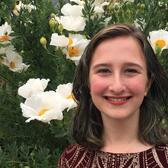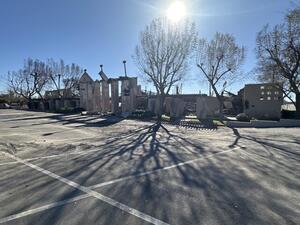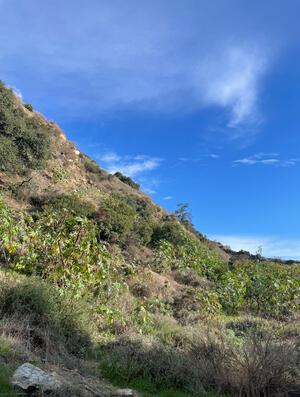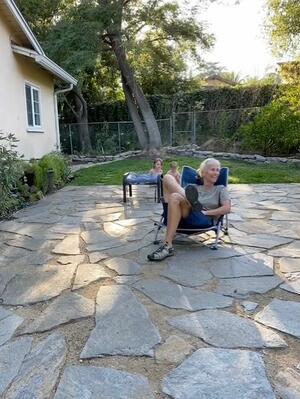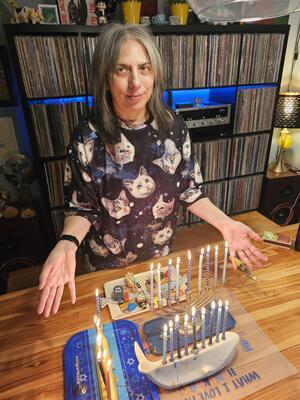After the LA Fires: Jewish Women's Voices
On January 7 and 8, 2025, intense Santa Ana winds propelled wildfires into parts of Los Angeles, leading to the destruction of over 12,000 homes and structures, and the loss of 29 lives. The largest of these fires, the Eaton Fire and the Palisades Fire, consumed over 40,500 acres, an area larger than San Francisco or Paris. Among the buildings destroyed was the Pasadena Jewish Temple and Center, a 100-year-old Conservative synagogue.
These facts are difficult to absorb, but the reality is even more painful. I have lived on the border of Altadena and Pasadena my entire life. To me, there is no other home than the brush-covered mountains teeming with wildlife, the vibrant and artistic community, and the palm tree-lined roads.
I was at home on January 7, still riding the post-Hanukkah high of latkes and family time. When the winds started, so did my fear. In Southern California, We know that Santa Anas bring risk, and with 100-mile-an-hour gusts pummeling our home, my life, along with the lives of my mom and dogs, had never felt so fragile. I left our home shortly before the fires started. My mom followed with the dogs after the fire ignited, fleeing the racing flames.
Even nearly three months after the fires, the losses of that night continue to echo. I wanted to hear from other Jewish women in the area about how the fires were continuing to affect them. What follows are reflections from the women I spoke with (lightly edited for clarity).
Susan Rogers, Altadena
That night [of the fire], we didn't get any notification that it was bad. My neighbors and I were going to hang out because the [wind] storm [that contributed to the fires] was going northeast and not toward Altadena proper.
Even so, the wind all day was horrible. We lost electricity at 6:15 p.m. I had solar in my house and I had the battery backup. And so my neighbors used my Wi-Fi, because we were watching out for each other. We weren't getting any updates and we weren't getting any evacuation orders. So I fell asleep. And when I woke up about 1:30 a.m. I looked outside and I went, “Oh my God, why is that mountain on fire?” Before I left, I put my refrigerator back on, because I didn't want my food to go bad when I came back. Isn't that funny? And so [my neighbors and I] left at about 2:30 a.m.
I lost everything I've ever accumulated my whole life, and it's really, really hard. And I think what makes it hard now is you're going along and you need something and you know it's in your house and you know exactly where it is in your house. And you go, “Oh, I used to have that, too.”
The shared grief is very helpful to me, making it like I’m not alone. So that is a comfort. I go through a lot of emotions. Anger is one of them, and the anger really has to do with the first responders for not letting us know [about the fire danger], for not practicing and knowing that we are a disaster-prone area because of wildfires and that they didn't at least send somebody house-to-house, to get people out of Altadena [when] it's going to burn up. [When I left], I did not see one cop car, did not see one fire truck. Nobody was there. That was very, very upsetting to me.
I don't let that take over, because it is just not it's not going to do any good. What is really amazing are the volunteers and the people who came out immediately to help us. I cannot say enough about them. The volunteers are my heroes. You would pull your car up in some of these places and you'd open your window and they would lean on your window and say, “What do you need?”
I found out my synagogue burned down too. And people went out to help the people of their congregation or anybody who needed help. They were giving us meals and cards and it was the most amazing thing. They knew my name and they had everything all prepared for me. I mean, it brought me to tears. The religious organizations that came out to help people have blown me away. I'm not the most religious person. But that was a very defining thing for me to have those people come out and help other people and other organizations, no matter what your background was. I will never forget that. I hope, before I die, I can somehow give back to them.
I'm older, and sometimes I wonder if [this experience with the fire] would have been easier had this happened to me when I was younger. I'm not going to rebuild, because the process is going to be long and you never get back what you put in and the years it will take me to do that, I don't have it. So whatever I do, if I have to get another house, I'm going to store a U-Haul on that property.
I'm grieving that I may not be coming back. That's really hard. I say losing a child is probably one of the worst things you can go through, but this is right up there. I will never stop loving Altadena. It is and has been my home and I hope I can find another home, though I'll probably just find a house.
What I would tell people is do not do this by yourself. Do not walk alone in this grief. I rely on everybody. It’s a hard thing to do if you're an independent person, and I am. But you have to, because you cannot go it alone. That's why when the synagogue reached out and all these other people reached out, I just grabbed hold of my little lifeline. I think people are more resilient than they give themselves credit for. We will rise and we will succeed. But don't do it alone.
Tina Lerno, Altadena
I love Altadena and have felt so welcome, but people [here] don’t get [what it’s like to be Jewish]. I hate being the one to explain what it means to be Jewish and to be the "Hanukkah mom" in my kids’ schools. I have pink hair and carry a tote bag that says Schlepper and wear a large Jewish star necklace and that’s confusing to some people in the Altadena community because they are trying to see how my views [on politics] align with theirs. Some people see the star and scowl, and it’s very upsetting. Because before [October 7] I was an oddity, but a welcome oddity. But it’s changed. [I suppose] I don’t know where to find my people in Altadena. I don’t think it’s gotten better since the fire.
On the night of the fires, one of the things I grabbed that first night was my grandfather’s–[a part] from when he worked in a baby carriage factory back in Denmark. That was the first thing I grabbed because it’s this tie to my family. I think a lot about how we keep these threads of history preserved.
I’m not a religious person, but there was a little bit of me where it felt like a Passover moment. I had a mezuzah on my house. I don’t know why my house survived, if it was the neighbor with the hose or a nearby water tank, but the proximity of the burn was feet away. It’s like an oasis [in the burn zone]. And part of me wants to believe that I was being watched over. I know that the temple community was very strong and they have support, but those of us who aren’t part of it…I wish I felt this community. And I wish I felt supported more.
[Another part of my fire experience is] I am always living with the collective trauma of the Holocaust. My dad is from Denmark and escaped to Sweden in a fishing boat. Whenever I go back to our house, I cannot believe [the fire] has happened and my neighborhood is gone and it looks like World War II, like bombed villages. And if you didn’t grow up with the [intergenerational] experience of the Holocaust, I wonder if your experience with the fire feels different. To me it feels like a continuation of that tragedy.
I never thought I would have that same sense that nothing will be the same that my father did [during the Holocaust]. The dishes are still in my sink. It looks like a movie set that was my house. And I had just put away all my Hanukkah stuff, and that was another thing I thought about, my menorahs and if those are worth trying to remediate and clean. I think about my seder plates in the kitchen. But I’m not surrounded by Jewish folks to have that sense of community. I love my neighbors and the Altadena community and that’s what drew me here, but it’s separate from my Jewishness. I wish there was an Altadena Jewish community I felt connected to.
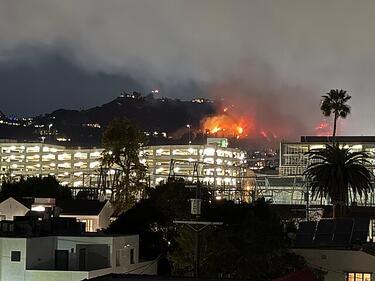
View of the Sunset Fire from a rooftop in West Hollywood, Los Angeles, January 8, 2025 (via Wikimedia Commons).
Tori Gleiberman, Los Angeles
Every time you say January 7 [asking about the fires], all I think is October 7. That's all I hear in my head, maybe because that's what's really affecting me this week.
We were on edge the whole entire time [of the fires], thinking that we were next. Every night [I was] packing up everything I own, putting it in the car, having a plan and then … it was fine in the morning. But it was terrifying. I feel like there's no real way to capture the level of fear from that time. My daughter and I were scared out of our minds. And then when LA County sent out the emergency alert to the whole entire city accidentally, my daughter and I were at the supermarket and I literally screamed at the top of my lungs because I was like, “We've got to get back home [and] get the dogs.”
My advice to others is that [physical] things really don't matter. My daughter said, “Oh, take all these pictures, Mom.” I go, “No. I got your bat mitzvah books. I've got my great-grandmother's menorah. That's all I really need, and the dogs.” You know, you just prioritize.

